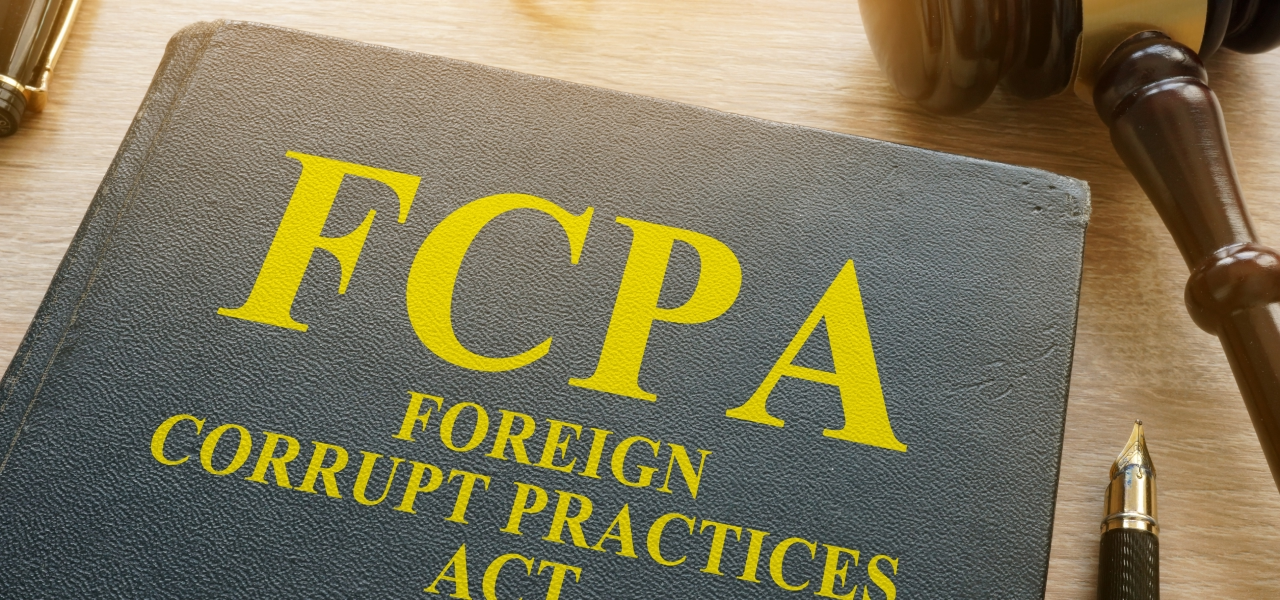What about the FCPA?

The Foreign Corrupt Practices Act (FCPA) of the United States was a legislative milestone in the global fight against corruption. Since its enactment, this law has been a powerful tool for promoting business ethics and ensuring transparency in international operations. It has also served as an inspiration for local regulations in other countries, which seek to purge the ills of corruption – a problem that plagues nations equally, regardless of their level of development or size.
The FCPA was enacted in 1977 against a backdrop of growing public concern over corporate and government integrity. Its origins are directly linked to a series of corporate bribery scandals uncovered in the 1970s. Investigations by the US Securities and Exchange Commission (SEC) revealed that American companies were routinely paying bribes to foreign officials to secure contracts, obtain licenses, or influence business decisions in their favor abroad.
One catalyst for the FCPA's creation was the Watergate scandal. While focused on US domestic politics, Watergate exposed a broader culture of unethical and illegal conduct that extended into the corporate sector. The perception that corruption was eroding public trust in institutions and damaging the US international image became undeniable. There was a pressing need for robust legislation to specifically address transnational corruption, not only to restore public faith but also to align American business practices with the ethical and democratic values the country professed, and to protect the shareholders investing in these companies.
The FCPA is structured around two main provisions to comprehensively combat corruption:
- Anti-Bribery Provisions: these form the core of the law. They expressly prohibit companies and individuals from offering, paying, promising to pay, or authorizing the payment of money or anything of value to a foreign public official to influence any official act or decision, or to secure any improper advantage in obtaining or retaining business. The breadth of these provisions means that any payment or benefit, direct or indirect, made with corrupt intent to influence a foreign official can be considered a violation.
- Accounting Provisions: these provisions complement the bribery prohibitions. They require companies trading on US securities markets (whether US or foreign) to maintain books and records that accurately and fairly reflect the company's transactions.
Furthermore, companies must implement and maintain a system of internal accounting controls that provide reasonable assurance that transactions are executed in accordance with management's authorization and that assets are properly accounted for. The goal was to prevent bribes from being disguised as legitimate expenses and to ensure management has full visibility over financial transactions to prevent and detect corrupt activities.
The enactment of the FCPA was not merely a domestic legislative act; it was a pioneering move on the world stage. By setting a new standard for global business conduct, the FCPA inspired similar anti-corruption legislation in many other nations, solidifying the US leadership position in promoting integrity in international trade.
The Purpose of the FCPA
The main purpose of the FCPA transcends merely punishing acts of bribery; it seeks to reshape the international business environment by promoting integrity, transparency, and fair competition. The Act was designed with several interconnected objectives in mind:
|
Purposes |
Description |
|
Level the Playing Field |
In a world where bribery was, in some regions, a common business practice, companies that refused to participate were often at a competitive disadvantage. The FCPA sought to change this dynamic, ensuring that American companies could compete on a level playing field based on the quality of their products and services, not their willingness to bribe. By prohibiting bribery, the FCPA aimed to eliminate the unfair advantage corruption provides, allowing fair competition to prevail. |
|
Protecting the Reputation of American Companies |
The bribery scandals of the 1970s damaged public trust and tarnished the reputation of American companies abroad. The FCPA was an attempt to restore and protect this image, demonstrating a US commitment to the highest ethical standards. A reputation for integrity is a valuable asset, attracting trusted business partners, investors, and talent, which contributes to long-term success. |
|
Strengthen Corporate Governance |
The FCPA's accounting provisions are crucial for this purpose. By requiring accurate financial records and robust internal controls, the law compels companies to develop effective corporate governance systems. Such systems are essential for detecting and preventing corruption, ensuring ethical decision-making, and the appropriate use of company resources. Strong governance not only mitigates FCPA violation risks but also promotes sustainability and corporate responsibility. |
Beyond these objectives, the FCPA reflects a broader US commitment to leading global anti-corruption efforts. The law serves as a model and an incentive for other jurisdictions to develop and enforce their own legislation, contributing to a collective international effort to eradicate a practice that is detrimental to economic development and political stability. Furthermore, no other country's law applies and enforces its anti-corruption statutes with the same rigor and exemplary punishment for violators (both companies and individuals).
FCPA Amendments
The FCPA has not remained static since its enactment. As the global business environment evolved, the law was amended to remain effective and relevant. Several changes have been introduced to strengthen its application, refine its definitions, and expand its jurisdiction.
One of the most significant changes occurred in 1988. This amendment addressed ambiguities and concerns raised by the business and legal community regarding the original law's interpretation and application. The modifications included:
|
Changes |
Definition |
|
Better Definition of Terms |
Key definitions, such as “foreign official” and “foreign instrumentality,” were clarified. This helped companies better understand who the bribery prohibitions applied to, reducing uncertainty and facilitating compliance. Understanding who constitutes a “foreign official” is vital, as it encompasses not only direct government employees but also employees of state-owned enterprises or entities performing governmental functions. |
|
Introduction of Affirmative Defenses |
The 1988 amendment introduced two affirmative defenses to bribery charges, allowing companies to defend certain practices under specific conditions: – Payments Legal Under Local Law: a defense may be raised if the payment was legal under the written laws of the foreign country. This recognizes that local laws may have different standards, though this defense is limited as bribery is rarely legally permitted. – Reasonable and Bona Fide Expenses: another defense may apply to payments that are reasonable and bona fide expenses, such as travel and lodging, directly related to promoting products or services or performing a contract. This aims to distinguish between bribery and legitimate business expenses. – Facilitation Payments: Although not a formal defense, the amendment also clarified the exception for “facilitation payments.” These are small payments to foreign officials to expedite or ensure routine, non-discretionary government actions (e.g., processing permits or visas, load or unload cargo). Such payments are not considered bribes under the FCPA, reflecting a pragmatic acceptance of certain commercial realities, though they remain a complex and risky area and are not viewed favorably by US courts. |
Another major change occurred in 1998, driven by the US ratification of the Organization for Economic Cooperation and Development (OECD) Convention on Combating Bribery of Foreign Public Officials in International Business Transactions. The convention aimed to harmonize anti-corruption laws among member countries. This amendment significantly expanded the Act's jurisdiction in member countries. The FCPA now applies to certain foreign entities and individuals who are not issuers of securities in the US, but who engage in corrupt acts while in the territory of the United States. This means that even a foreign company or individual who uses US mail, wire transfers, or any other instrumentality of interstate commerce to facilitate a bribe can be prosecuted under the FCPA. This expansion solidified the US commitment to fighting corruption on a global scale, allowing the US DOJ and the SEC to pursue a broader range of offenders.
Suspension of the FCPA by President Donald Trump
The FCPA's remarkable trajectory of strengthening and adaptation reached a significant turning point on February 10, 2025. On this date, then-President Donald Trump signed an executive order suspending enforcement of the FCPA for 180 days. This unexpected decision was justified by the administration as a response to the “excessive and unpredictable” application of the law, which it claimed was harming US economic competitiveness.
The suspension generated considerable debate and concern both in the US and internationally. A major fear was a setback to long-standing anti-corruption efforts, sending the wrong message about the US commitment to business ethics and potentially opening the door to the very practices the law was designed to eradicate. Uncertainty about the Act's future and its impact on international business conduct was widespread in the international community.
During the 180-day suspension, the US Attorney General was instructed to take the following actions:
|
Actions |
Definition |
|
Cease Further Investigations and Legal Actions |
The order suspended the opening of new FCPA cases, except in undefined “exceptional circumstances.” This created ambiguity and discretion in its application, severely limiting enforcement agencies' ability to act against new violations for a time. |
|
Review Ongoing Investigations and Proceedings |
The Attorney General was also tasked with reviewing all existing FCPA cases to ensure enforcement was aligned with US “economic and national security interests.” This directive raised concerns about political interference in legal cases and the potential discontinuation of important proceedings for non-legal reasons. |
|
Update Enforcement Guidelines |
A key part of the order was to review and modify the FCPA enforcement guidelines. These new guidelines were intended to reflect the Trump administration's priorities, which appeared to lean toward a greater emphasis on protecting US economic competitiveness, even if it meant softening the anti-corruption stance. |
The suspension of the FCPA was a bold, overtly political move that highlighted the tension between anti-corruption goals and concerns about national economic competitiveness. The episode underscored the FCPA's role as a pillar of US foreign and trade policy, and the controversy demonstrated the law's importance to the international community. The wait for new guidelines after the suspension period was met with great anticipation, as they would define the future direction of FCPA enforcement.
New Enforcement Guidance Published by the US DOJ
The period of uncertainty generated by the FCPA's suspension ended with the publication of new enforcement guidance by the US DOJ on June 9, 2025. These guidelines marked not only the re-establishment of the law but also a strategic reorientation aimed at balancing anti-corruption objectives with US national interests and economic competitiveness. The new approach sought to streamline enforcement, concentrating resources on the most impactful and strategically relevant cases.
Key changes and emphases in the new guidelines included:
- Focus on Cases of High Strategic Significance: the guidelines instruct the DOJ to prioritize FCPA cases that pose significant threats to US national security or substantially affect American economic competitiveness. This means the DOJ would focus on corrupt conduct with geopolitical implications, cases targeting strategic sectors of the US economy, or those involving large companies or prominent figures with a potential systemic impact. This selective approach aims to maximize impact by directing resources where they can generate the greatest strategic benefit.
- Reducing Regulatory Burdens and Closing Minor Cases: to alleviate the burden on American companies operating abroad, the new guidelines encourage the closure of minor cases, both ongoing and new. The goal is to reduce the bureaucracy and costs associated with compliance for companies involved in less significant violations, allowing them to focus on core operations and economic growth without diverting excessive resources to legal defenses for marginal issues. This measure acknowledged previous concerns about “over-enforcement” and sought a more pragmatic balance.
- Alignment with National Interests and Focus on Harmful Conduct: the guidelines emphasize that FCPA enforcement should be aligned with the broader strategic interests of the United States. The DOJ will therefore focus on combating corrupt conduct that undermines these interests, whether by weakening allies, financing adversaries, or distorting markets to the disadvantage of the US. Enforcement of the FCPA is now framed not only as a tool to combat immorality but also as an instrument of foreign policy to protect and advance US national objectives.
These new guidelines represent a significant shift in FCPA enforcement policy. While the law remains an essential tool in the fight against corruption, its enforcement now reflects a more strategic approach, guided by US national priorities and seeking to optimize its impact in line with American political and economic goals.
It is not yet clear whether these measures will represent a setback in the global fight against corruption. However, there is certainly concern within the international community regarding these changes, which affect the world's most prominent and successful example of anti-corruption enforcement.



.avif)